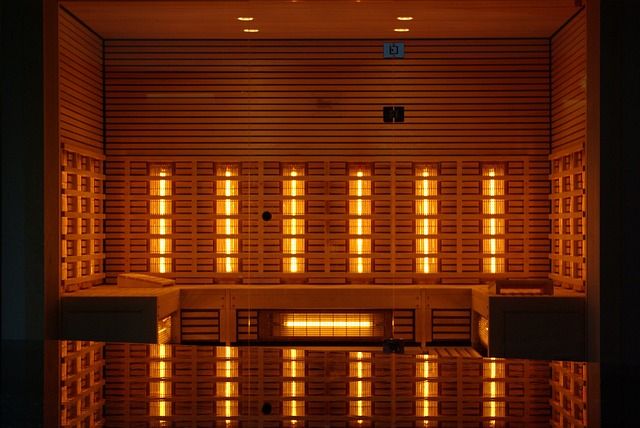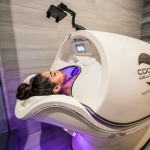Over the years, infrared saunas have become very popular in spas, gyms, homes all over the world. Not only can infrared sauna therapy sessions help you to relax and rejuvenate, but they also have plenty of other benefits such as improving sleep, easing sore and aching muscles, etc.
While largely, the use of infrared sauna is considered to be safe, there may be some side effects of using one. In this article, we will discuss all that you need to know before you decide to go in for infrared sauna sessions.
What Is an Infrared Sauna?

Traditional saunas typically work at temperatures between 180°F to 200°F and work by heating the air around you. However, infrared saunas make use of infrared lamps that produce electromagnetic radiation to heat your body directly instead of the air around you.
Infrared saunas work by heating the core body temperature to only around 150°F. This infrared heat penetrates deeply into your body and helps to detoxify via sweating and also helps to heal deep tissue.
Infrared Sauna Side Effects
While the benefits of infrared sauna usage are quite impressive and include many advantages including relaxation, relief from sore and aching muscles and improved sleep, etc. However, like everything else, the benefits also come with some limitations. So, before you step into an infrared sauna, it is a good idea to take note of some of the risks and side effects of sauna therapy.
Some of the symptoms and side effects of infrared sauna use include:
- Heat discomfort (mild to moderate)
- Lightheadedness
- Low blood pressure
- Irritation of the airways
- Brief leg pain
Let’s take a look at some of the more serious side effects of infrared sauna therapy:
Dehydration
The heat produced by the infrared sauna penetrates your body and causes you to sweat. This can cause depletion of the water from your body. And, if the sweating occurs rapidly, then you can get dehydrated and according to Mayo Clinic, this can especially occur more quickly in elders and children as compared to healthy adults. So, to prevent dehydration, you must drink plenty of water and be well hydrated before a sauna session and also after getting out of the sauna.
Heat Stroke

If you do not hydrate yourself well and leave the dehydration untreated, then it can turn into heat exhaustion or a heat stroke. When your body is not able to cool down after it is exposed to excessive heat, then it causes a heat stroke, which can have serious effects, including death.
It is always a good idea to monitor how you are feeling when you’re inside the infrared sauna and if you notice any signs such as headache, nausea, dizziness, rapid heartbeat or fainting, then you should get out of the sauna immediately.
Joint Injury
If you’ve recently had any joint injuries as a result of an accident, sports or exercise, then you must avoid using the infrared sauna for around 48 hours after the injury or until the swelling subsides. Any exposure to heat can aggravate the injury and delay the healing process. Follow the R.I.C.E. technique in the case of any injury i.e.,
- Rest the joint.
- Ice the injured area instead of applying heat.
- Apply compression on the injured area.
- Elevate the injured area until the swelling subsides.
Infection or Disease
If you’re suffering from some disease or infection, the heat from the infrared sauna can cause serious side effects. For instance, if you’re suffering from diseases such as multiple sclerosis, cancer, diabetes, hypotension, hypertension, heart disease, hemophilia or Parkinson’s disease, the disease may affect the ability of your body to cool itself.
Also, some active infections, particularly tissue infections can also cause side effects with the use of an infrared sauna. So, if you’re suffering from any disease or infection, then it is recommended that you speak with your doctor or medical practitioner before using an infrared sauna.
Medications

If you are taking certain medications, then infrared therapy can cause certain side effects. So, before using the infrared sauna, check with your doctor if you’re taking medications such as diuretics, beta blockers or barbiturates that can hamper the natural ability of your body to sweat or affect your heart rate.
When You Should Avoid Infrared Saunas

While infrared sauna therapy is generally considered safe, however, if you have a medical condition (acute or chronic), are on medications or have any implanted medical devices, then you must be cautious and before you encounter any type of heat exposure, it is recommended that you speak with your medical practitioner.
People with low blood pressure, kidney disease and taking medications such as drugs for lowering blood pressure, diuretics and other medications, which can cause dizziness are prone to overheating and dehydration and must use the infrared sauna with caution.
In this section, we have discussed a few health conditions that may require that you avoid sauna therapy completely or get a clearance from your doctor before you go ahead with one.
- Pregnancy
- Nerve and Motor Function Conditions: Having a neurological deficit can hamper your sense and response to heat and can increase your risk for burn or heat injuries.
- Age Considerations: Older adults are prone to dizziness and dehydration with dry heat and can lead to falls. Before your child uses the infrared sauna, check with their doctor.
- Heart Conditions: People with heart arrhythmia like atrial fibrillation, myocardial infarction, angina pectoris or cardiovascular diseases must speak with their doctor before using an infrared sauna
- Open or Unhealed Wounds: If you are recovering from surgery or have any open wounds, then wait until they are healed before using an infrared sauna.
- Weak immune system
- Brain tumor
- Stroke
Infrared Sauna Usage Tips

If you’re using an infrared sauna, then it is extremely important to follow certain guidelines to ensure your safety and prevent any adverse effects.
- Get medical clearance from your doctor before using the infrared sauna, especially if you suffer any conditions that are contraindicated.
- Stay hydrated. Ensure that you drink plenty of water before a sauna session, during the therapy, especially if you are sweating excessively, feel thirsty or light headed and after the sauna therapy session.
- Start slow. Begin with small sauna sessions of around 10 to 15 minutes and when you get comfortable, you can add time to every session until you reach around 20 minutes. Depending on your goal, around 3 infrared sauna sessions per week should be fine.
- Pay attention to symptoms and if you feel light headed or dizzy, then stop the session at once because these could be signs of dehydration or some other medical condition. And, if the symptoms persist, you should get medical help immediately.
- Avoid drinking alcohol before a sauna session because this can lead to overheating and dehydration resulting in heat exhaustion or heat stroke.
- Avoid using the infrared sauna if you have a skin condition like eczema, psoriasis, etc. or sensitive skin because exposure to heat can cause skin irritation.
Infrared sauna therapy can be wonderfully relaxing and is generally safe for most people. However, that may not be necessarily true for everyone. If you’re an older adult, a child, pregnant or suffer from a health condition, then it may be advisable for you to avoid using the infrared sauna. These conditions may increase your risk of complications.
So, before you hit the sauna, consider your health condition and check with your doctor. And, if the risks offset the benefits, then you could consider some other method of exercise or workout to experience the benefits of increased heart rate and sweating.


